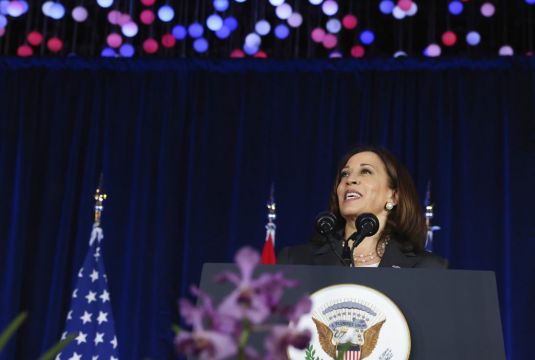Vice President Kamala Harris has delivered a sharp rebuke to China for its incursions in the South China Sea, affirming that the US will support its allies in the region against Beijing’s advances.
In a major foreign policy speech in Singapore on Tuesday in which she laid out the Biden administration’s vision for the Indo-Pacific, Ms Harris said: “We know that Beijing continues to coerce, to intimidate and to make claims to the vast majority of the South China Sea.
“Beijing’s actions continue to undermine the rules-based order and threaten the sovereignty of nations.”
The speech sought to cement the US commitment to supporting its allies in an area of growing importance to the Biden administration, which has made countering China’s influence globally a centrepiece of its foreign policy.
Ms Harris, who is on a week-long swing through Southeast Asia, declared that the US “stands with our allies and our partners” in the face of threats from China.
The address offered an opportunity for the former state attorney general and US senator to prove her fluidity with diplomatic and security issues.
Ms Harris’s remarks also come during a critical moment for the United States as the Biden administration seeks to further solidify its pivot towards Asia while America’s decades-long focus on the Middle East comes to a messy end with the chaotic withdrawal from Afghanistan.
On Monday, Ms Harris told sailors aboard a US combat ship at the Changi naval base in Singapore that “a big part of the history of the 21st century will be written about this very region” and that their work defending the region was pivotal.
She said: “It is in our vital interest to stand united with our allies and our partners in Southeast Asia in defence of a free and open Indo-Pacific.”
Ms Harris also met with Singapore President Halimah Yacob and prime minister Lee Hsien Loong.

The vice president’s office announced a number of agreements out of that meeting aimed at combating cyberthreats, tackling climate change, addressing the Covid-19 pandemic and alleviating supply chain issues.
After her speech on Tuesday, Ms Harris will hold a roundtable discussion with business leaders on supply chain issues, and then travel to Vietnam, where she will meet with top officials.
President Joe Biden himself has repeatedly emphasised his focus on China as one of America’s main adversaries, pledging in a February speech at the State Department to “confront China’s economic abuses; counter its aggressive, coercive action; to push back on China’s attack on human rights, intellectual property, and global governance”.
The chaotic US withdrawal from Afghanistan, however, has complicated the message of support to the region, raising questions about the US commitment to its allies.
While Mr Biden said last week that an indefinite engagement would have benefited “true strategic competitors” China and Russia, China has seized on the images of violence from the evacuation to slam the US for its engagement there.
Chinese Foreign Ministry spokesperson Wang Wenbin said on Monday that the US had done “unscrupulous and dishonest things” in Afghanistan and called on the nation to help rebuild.
But Ms Harris, during a joint news conference with Prime Minister Lee on Monday, said that her presence in the country, combined with the agreements around greater cooperation that the Biden administration has pursued with Indo-Pacific countries, speak “volumes in terms of the integrity of the relationships that the United States has around the world on many issues”.







